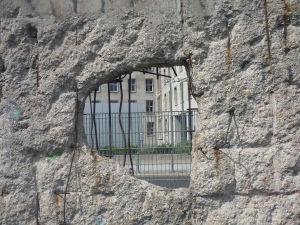“Of all social institutions language is least amenable to initiative. It blends with the life of society, and the latter, inert by nature, is a prime conservative force.” – Ferdinand de Saussure
On a recent citybreak to Berlin, I attempted to practice my rustly and ill-used Deutsch. Mostly, this failed miserably and yet I found that getting around was easy.
We found most german’s would gently humour our attempts to speak the language, reply very s-l-o-w-l-y t ensure we understood or immediately beckon, “English? Okay. Here’s what you do.” Why this need to help us? As foreigners in a proud and well-established country, we should have been striving to speak the language (which we were more familiar with than most tourists) but instead, they immediately strove to accommodate us, an initiative seemingly symptomatic of many foreign peoples’ attitudes to (the) English.
The imperialistic takeover of most of the world seems tied to this very concept of language. Expression. Communication. The presentation of oneself through a recognised form of social interaction. The assumptions usually are that native english-speakers do not care to ever make the effort to mold themselves to a new culture, but instead rather like an ill-formed peg, they force themselves through an otherwise organic, amorphous fluid society.
The very act of attempting to speak another language incites such friendliness and glee that it represents a severe lack of any attempt by other similar tourists to adhere to this small piece of social etiquette.
 The anglification of these countries can only be seen as inevitable. The need to deny these people their own true form of expression serves as a twenty-first century gag in a continuing move towards “English” (the language, not always the people) being synonymous with a smug, self-important sense of being, which grates on other cultures, making them (or us) outsiders without even the luxury of trying to integrate.
The anglification of these countries can only be seen as inevitable. The need to deny these people their own true form of expression serves as a twenty-first century gag in a continuing move towards “English” (the language, not always the people) being synonymous with a smug, self-important sense of being, which grates on other cultures, making them (or us) outsiders without even the luxury of trying to integrate.
Gayatri Spivak looks at the possibility of integrating with an alien culture in a post-colonial context. Yet, are not all cultures in some way alien? We are merely better informed of some, either through close proximity or over-representation in our chosen, narrow media space.
“Language is an archeological vehicle … the language we speak is a whole palimpsest of human effort and history.”- Russell Hoban
Our ability to really access another country’s culture, history and indeed, soul is caught up in its outer skin of language, one which we can brush against, but never really enter.
Originally posted here




